I've found this dictionary by William Whitaker on the Internet and I like its parsing capabilities. But the output doesn't fit for me.
The issue (challenge for me):
Given an input form such as "audiam", the program returns the following output (plain text):
audi.am V 4 1 PRES ACTIVE SUB 1 S
audi.am V 4 1 FUT ACTIVE IND 1 S
audio, audire, audivi, auditus V (4th) [XXXAO]
hear, listen, accept, agree with; obey; harken, pay attention; be able to hear;
But I just want to receive the following text output (same input: audiam):
audiam=audio, audire, audivi, auditus
That is:
InputWord=Dictionary_Forms
So some pieces of information are needless for me.
How can I change the output of this program by modifying the Ada code?
I don't have any Ada knowledge, but I know Delphi/Pascal so it's quite easy to understand the code, isn't it? So the parts causing the text output seem to be the TEXT_IO.PUT(...) statements, right? They're all called in list_package.adb so this is probably the source file to look at.
What has to be changed in particular?
The full Ada 95 source code of this program is available on this page.
I hope some of you are able to understand Ada 95 code. Thank you very much in advance!
My compiling problems:
For use on a windows machine, I downloaded MinGW and tried to compile the source files using "MinGW Shell". But this was my input and the shell's reponse:

Compiling with the latest Cygwin version:
When I compile the program using the latest version of Cygwin, there is no error message:

There is even an .exe file which is created. Its size is 1.6 MB (1,682,616 bytes). But when I open it, it closes right away. What has gone wrong?